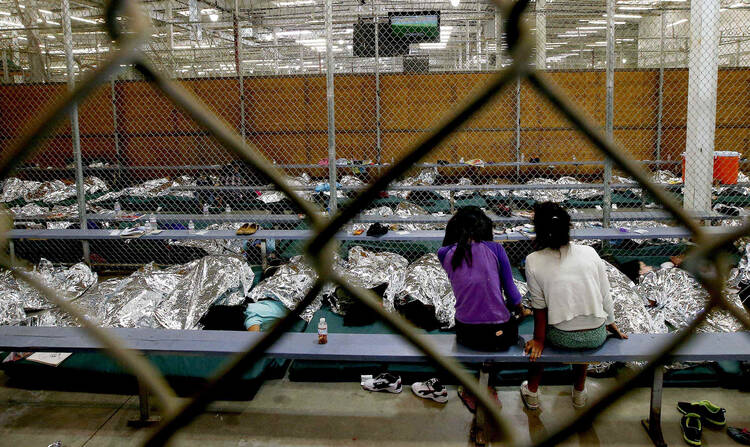Bishop Eusebio Elizondo, auxiliary bishop of Seattle and chairman of the U.S. Conference of Catholic Bishops’ Committee on Migration, called upon the Obama Administration on July 2 to reconsider its request to Congress for “fast track” authority to expedite the removal of unaccompanied children fleeing violence in Central America. Current law permits children from non-contiguous countries to remain in the country until their request for asylum or immigration relief is considered by an immigration judge.
“This is a very vulnerable population which has been targeted by organized crime networks in Central America,” said Bishop Elizondo. “To return them to these criminal elements without a proper adjudication of their cases is unconscionable.”
Under the policy of “expedited” removal, an individual is questioned by an immigration enforcement official without formal legal training in an effort to ascertain their fear of return. If the individual cannot adequately articulate a “credible” fear, they are immediately returned to their home countries. Children who are traumatized, without legal assistance and reluctant to speak to enforcement personnel rarely meet this standard, according to the U.S.C.C.B.
“As a nation which has traditionally offered safe haven to those who are persecuted, this proposed policy undercuts our values as a nation,” Bishop Elizondo said. “The prospect of the United States sending vulnerable children back into the hands of violent criminals in their countries raises troubling questions about our moral character.”
“What we need is bipartisan cooperation to ensure that these children are protected,” said Bishop Elizondo. “This is an occasion in which we must rise above partisan politics and stand by our principles, namely compassion, justice, and adherence to our international obligations,” he said.
Speaking before a House Judiciary Committee on June 25, Bishop Mark Seitz, bishop of the diocese of El Paso, Texas, essentially urged Congress members to respond to the problem of unaccompanied minors at the border as if it were a humanitarian crisis not a immigration control problem, suggesting an interagency response, more funding for processing and placing unaccompanied migrants and an approach that seeks to pursue the best interests of individual children according to international humanitarian standards. That would include rapid settlement in least restrictive environments, preferrably with existing family members. The bishop promoted a holistic approach that includes efforts to respond to social issues in their home countries that are propelling the unprecedented flight of these children and young people.
He testified, "Currently, decisions about the welfare of [unaccompanied children] are made separately from the existing U.S. child welfare infrastructure, meaning that court decisions on the welfare of [unaccompanied children] are based on their eligibility for immigration relief alone rather than involving a comprehensive assessment of the best interest of the child. Whenever possible," he said, "policies and procedures should be implemented that help the child progress through the system in a way that takes into account his/her vulnerabilities and age, such as the establishment of immigration court dockets for unaccompanied children and the creation of child-appropriate asylum procedures.
"The protection of migrant children is an especially important issue for the Catholic Church, as one of Jesus’ first experiences as an infant was to flee for his life from King Herod with his family to Egypt. Indeed, Jesus Himself was a child migrant fleeing violence," Bishop Seitz told the committee. "Jesus, Mary, and Joseph were asylum-seekers and faced the same choice as the one facing thousands of children fleeing to the United States each year.
He added, "This special population of vulnerable children...are very close to my heart as I have met with many of them, some as young as five years old, while they were being cared for in Catholic Charities facilities in my diocese in El Paso. Bishop Seitz recently participated in a U.S.C.C.B. delegation to Mexio and Central America to examine the plight of unaccompanied children and youth.
"During our mission to Central America, we visited migrant children shelters, heard tearful stories from grandmothers waiting to pick up their recently repatriated grandchildren and listened to children as young as six years old speak solemnly of trafficking and exploitation that was inflicted upon them along their migration journey," he said. "The corresponding report that came out of our mission acknowledged that a new paradigm regarding unaccompanied children is upon us—namely it is clear that unaccompanied children are facing new and increased dangers and insecurity and are fleeing in response. As a result, this phenomenon requires a regional and holistic solution rooted in humanitarian and child welfare principles."
"With the increasing numbers of unaccompanied children arriving at the U.S.-Mexico border, we must understand who these children are, what is propelling them to travel alone on an increasingly dangerous journey, and what can be done to best address their welfare," said Bishop Seitz, noting that "violence perpetrated by organized transnational gangs, loosely-affiliated criminal imitators of gangs, and drug cartels, has permeated all aspects of life in Central America and is one of the primary factors driving the migration of children from the region."
Because of the threat of such gang violence, abuse in their own homes and because their own nations do not have the institutional capactity to protect them "a significant number of migrants, particularly youth, have valid child protection claims," according to the bishop.
Bishop Seitz said that while the church recognizes governments’ sovereign right to control and protect the border, "we hold a strong and pervasive pastoral interest in the welfare of migrants, including unaccompanied children and welcome newcomers from all lands."








